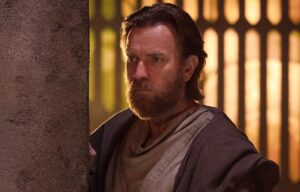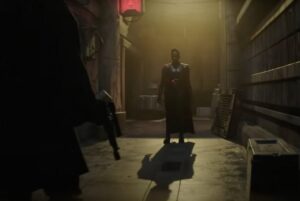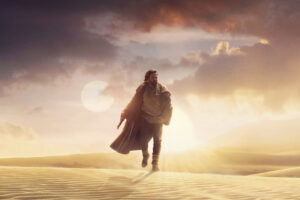SPOILERS FOR KENOBI EPISODES ONE AND TWO AHEAD!
If Lucasfilm plans to rely on Disney+ original series’ like The Mandalorian, The Bad Batch, The Book Of Boba Fett, and now Obi-Wan Kenobi, to keep the Star Wars franchise fresh in peoples’ minds while they work out where to go with the films following the conclusion of the Skywalker Saga and the poor reception to The Rise Of Skywalker, then I’m going to need the writers and showrunners of these series’ to get some fresh ideas because I genuinely don’t know how many more world-weary middle-aged single father figures to rambunctious children I can take from a franchise that has literally all the space in the galaxy to do something different but won’t because it worked that one time in The Mandalorian.

And Pedro Pascal did it really well in The Mandalorian season one, to be fair, which is why we all fell in love with the trope in the first place and presumably why Pascal is now being typecast as world-weary middle-aged single father figures to rambunctious children even outside of Star Wars. But in the two years since The Mandalorian debuted, with the exception of The Clone Wars‘ final season, the anthology series Star Wars: Visions, and a couple of Lego holiday specials, Star Wars has shifted focus entirely to making stories about – and seemingly targeted at – middle-aged dads.
Is that necessarily a bad thing? No, of course not. It’s not even necessarily indicative of lazy storytelling, because there are many different types of middle-aged dads to be found in this world, and even more to be found amongst the stars, so it stands to reason that there should be a number of subtly different stories to be told about middle-aged dads, each one unique in its own way and worth telling. But I do think it’s worth examining why Star Wars has become…shall we say, a little bit obsessed with this trope recently, before I get into my thoughts on the first two episodes of Kenobi, specifically.
If Star Wars had a long history of telling stories about middle-aged dads/father figures with small children, it would be one thing, but discounting all of the Legends material that Disney decanonized and looking solely at the movies and series’ released prior to The Mandalorian in 2019, there really aren’t that many dads…in fact, absent fathers and the absence of fathers are two recurring themes in the Skywalker Saga, which begins with Anakin Skywalker being born out of a sci-fi Immaculate Conception, then becoming a remote and unapproachable figure in the lives of his children, then being exhumed by his grandson Ben as a stand-in father figure for Ben’s own neglectful father, Han Solo. The cycle theoretically breaks with Rey, an orphan who adopts the Skywalker name and becomes the spiritual descendant of Anakin Skywalker, but sadly we never learned enough about her as a character to say with certainty what she’d be like as a parent.
Then you’ve got the mentors like Qui-Gon Jinn, Obi-Wan Kenobi, Yoda, and Luke Skywalker, who will inevitably become the single most important person in the lives of their apprentices after about fifteen minutes of training before dying…but it’s hard to call any of these men (or in Yoda’s case, male-coded aliens) father figures. Maybe Qui-Gon Jinn, but even when Obi-Wan Kenobi (Ewan McGregor) calls out to the Force-ghost of his former Jedi master in the first two episodes of Kenobi, I don’t hear the desperation of a son needing a father’s advice, but rather a student seeking the approval of a respected teacher.
After Qui-Gon’s death in A Phantom Menace, I think Obi-Wan tried to be both a mentor and a father figure to Anakin Skywalker, but he was never able to enforce the Jedi Code because of his own complicated relationship with the damn thing, and gradually Anakin started to regard him as a lenient older brother – one whom he loved deeply, but whose guidance he rarely ever felt he needed. I don’t think it’s too much of a stretch to extrapolate from this that Obi-Wan regarded Anakin’s son Luke as a nephew, especially when you look at their interactions in A New Hope. As for Luke, his relationship with his own students appears to have always been impersonal.
What was my point again? Oh yeah, dads don’t exist in Star Wars; at least as far as the Skywalkers are concerned (in case you’re wondering, moms do exist, but they either die in childbirth like Padmé Amidala or live long enough to become silent, stoic spectators in their sons’ lives, like Shmi Skywalker and even Leia Organa). But then The Mandalorian introduced Baby Yoda into our lives, and nothing has been the same since. Now, every middle-aged man in Star Wars has a child. Crucially, they’re never the biological fathers of these children – because Star Wars is about found-family, and there is something truly touching about characters from vastly different backgrounds forming profound emotional connections.
And for the most part, the trope has worked. I’ve made it clear in the past that, despite my gripes with The Mandalorian‘s sluggish pacing, I am deeply invested in the story of disillusioned bounty hunter Din Djarin coming to care for his pint-sized sidekick Grogu over the course of two seasons. I thought it was adorable when the battle-hardened clones of the Bad Batch adopted the experimental clone Omega and made her feel at home in their tight-knit family unit. I had far bigger issues with The Book Of Boba Fett than Fett randomly taking a teeny-bopper biker gang in off the streets of Mos Eisley (I never wrote about the show because, frankly, it bored me to death).
But my issues with Kenobi, while not limited to fatigue at the overuse of this trope, stem from the showrunners’ perplexing decision to put Kenobi through the single dad filter and saddle him with a small child – a ten-year old Princess Leia Organa (Vivien Lyra Blair), to be precise, kidnapped by mercenaries in the first episode and whisked away to a remote planet in an attempt to lure Kenobi out of hiding. That could have been a unique premise for some kind of sci-fi heist thriller, but Leia stays kidnapped for maybe twenty minutes total before Kenobi locates her in a storage unit, easily incapacitates her guards, and escapes.

Episode two concludes with the two characters returning to Alderaan, crisis seemingly averted, but it’s implied that they’ll get held up or forced to take a detour so that Obi-Wan Kenobi can learn an important life-lesson from Leia before they part ways – and so that Leia has a chance to meet her biological dad and Kenobi’s pursuer, Darth Vader (Hayden Christensen & James Earl Jones). She won’t be aware she’s just met her biological father, mind you, but fans will be and that’s all that really matters to Lucasfilm; at least based on the staggering number of thoroughly pointless callbacks and namedrops in these first two episodes.
Indeed, the stage is already set for just such an encounter, with ten-year old Leia struggling to reconcile her responsibilities as an Organa with her impulsivity, relentless curiosity, and recklessness – traits apparently common to all Skywalkers. She hates being cooped up in the royal palace, and frustrates her adoptive mother Breha (Simone Kessel) by skipping out on brunches with her cartoonishly pretentious cousins to go climb trees in the forest and watch starships all day, accompanied by an annoyingly cute droid that seems purposefully designed to sell merchandise. Every one of Leia’s scenes is written as if we don’t already know and weren’t literally just reminded in the recap preceding the episode that Leia is, in fact, still a Skywalker, but how could we forget when the characters stop dead in their tracks to tell us that Leia reminds them of someone (Anakin and Padmé. Don’t bother guessing or reading into it, it’s Anakin and Padmé).
Side-note, but there’s something extremely frustrating about the implication that most of Leia’s defining character traits come from her biological parents and not her adoptive parents who actually raised her, loved her, and gave her the life Anakin Skywalker was never going to be able to provide for her. Bail Organa (Jimmy Smits) has a lovely little monologue in the first episode to the general effect of “family is the people you choose, not the people chosen for you”, but his words are undermined by all the callbacks to the Skywalkers that serve only to pull focus from his and his wife’s contributions to the making of Princess Leia as we know her.
Kenobi‘s premise allows its writers to indulge in the kind of incessant namedrops and thinly-veiled references to other movies that quickly become cringeworthy than cute, but the blatant abuse of nostalgia works if the end-goal is to force viewers to look past the poor pacing, lackluster dialogue, and other technical and story issues. Forget that you just watched the same long, slow montage of Obi-Wan Kenobi taking the bus home from work and feeding his alien camel three times – there’s Temuera Morrison, cameoing as a clone trooper of the 501st! There’s that toy starship that Luke Skywalker played with in A New Hope exactly once, and it even has a completely unnecessary backstory now! That guy’s the Grand Inquisitor (Rupert Friend) from Star Wars: Rebels!
Now, to be fair, I was excited for the Grand Inquisitor – even after the trailers gave it away that his distinctive character design hadn’t made the jump from animation to live-action particularly well. I was certainly not expecting his character to be rendered incompetent and seemingly killed off near the end of the second episode, several years before the events of Rebels season one. Regardless of whether he’s dead or alive, however, one thing became clear to me in the moment that Reva (Moses Ingram) impaled him and left his body on the floor of a cargo-bay; Kenobi is probably not aimed at fans of Rebels.
Nor is it designed to appeal to fans of the sequel trilogy. If I had to guess, I’d say that Kenobi is a last-ditch effort by Lucasfilm to try and win back the people most likely to have disliked Rebels and outright despised the sequel trilogy – middle-aged men, particularly those with strong emotional attachments to the characters and settings from the original trilogy and prequel trilogy we’ve seen popping up on Disney+ in all the aforementioned dad-centric Star Wars shows. How much of that is Favreau’s obsession with recapturing the original trilogy’s aesthetics and Filoni’s desire to redeem the public image of the prequels as part of a commitment to George Lucas, and how much of that is Lucasfilm learning all the wrong lessons from the poor reception to the sequel trilogy? I wish I knew.
Favreau and Filoni’s fingerprints are all over Kenobi, although they weren’t involved in the show until surprisingly late in the writing process. Ironically, it’s been confirmed that they were enlisted to tweak the show’s scripts after noticing troubling similarities to The Mandalorian, which raises the question of how much of a blatant Mandalorian rip-off Kenobi must have been that even its revised version still plays out like a Mandalorian rip-off, hitting most of the same beats and falling into all the same traps. Filoni also took the opportunity to insert the Grand Inquisitor, one of his own original characters, into the script (which, come to think of it, might explain why the writers killed him off first chance they got). And of course, Kenobi director Deborah Chow is one of Favreau and Filoni’s recruits, having worked on The Mandalorian season one.
It’s truly unfortunate that Chow and her talented cast are burdened with a writer’s room at war with itself, because here and there are glimmers of what Kenobi could be if it only knew what it was trying to be, and how to get to that point swiftly and directly. In Obi-Wan Kenobi’s self-imposed exile on Tatooine, I see the potential for a raw and unflinching character study, something wholly unlike anything we’ve seen before in Star Wars. You want to throw Darth Vader in there too, explore Kenobi’s guilt over losing his closest friend – his brother – to the Dark Side and the toll of isolation on a mind already fractured by that kind of anguish, sure! I’d be down for that.
Or…we could do another show about a grumpy middle-aged guy and a small child working together to fight bad guys while running around the galaxy. That works too, I guess. It’s just…not the kind of Obi-Wan Kenobi story I would have expected to be set after his self-imposed exile on Tatooine, that’s all. It makes you wonder why Kenobi would go back to Tatooine after this is over if he realizes now that Leia is every bit as important as Luke and requires the same constant surveillance to ensure that someone doesn’t…I don’t know, kidnap her again. Not like the high-profile daughter of a senator publicly opposed to the Empire’s authoritarianism might be in constant danger or anything.
I can nitpick stupid stuff like that, but we’d be here all day and it wouldn’t get us anywhere because ultimately, my problem with Kenobi is just that I’m not feeling the decision to make it another single dad story in the style of The Mandalorian, but I can’t fully explain why, even to myself. I just know it’s not working for me yet and I’m getting a bit tired of the trope, but if you enjoy all these stories about single dads, or if you can relate to them on an emotional level, or if you just think single dads are attractive, more power to you.
I debated publishing this post because I hate to be critical of something that people seem to be having a fun time with, especially when my issues with it aren’t concrete, but hey, it happens sometimes. I don’t like everything that Marvel’s been putting out lately, either, and it’s caused me to stop writing as frequently about either franchise.

Oh, one last thing before I go. I want to make it abundantly clear that regardless of your opinions on Kenobi, you should be able to express those opinions without resorting to racism, sexism, and other forms of bullying….and if, for whatever reason, you feel like you can’t, then there’s a better than even chance that you are a racist, a sexist, and a bully. And I will not tolerate the harassment of the show’s actors, who are just doing their jobs and putting in good performances, I might add, so if you’re tempted to spew that nonsense in my comments section, I will delete your comments and block you expeditiously.
Episode Rating: 5.5/10


